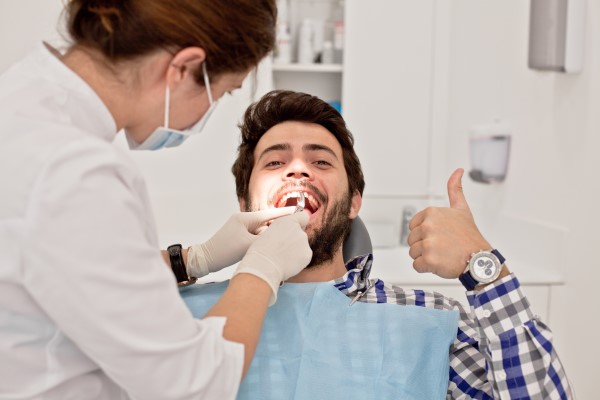What to Expect During a Dental Check-Up

Are you due for a dental check-up? Has it been a while? You may not know what to expect if you have not had a dental check-up in a long time. Read on to discover what happens during a typical dental check-up. Oral health is important, not only for your mouth but for your overall well-being, too.
The dental check-up procedure
When patients get to the dental office, they have their complete health history taken. This information will include medications, family history, or recent medical diagnoses such as diabetes or arthritis. The dental care team should know about any health concerns, anxieties, or allergies the patient may have to avoid issues during the appointment and ensure they receive the care they need. In addition, the dentist will also need to know if there have been any changes since the last appointment or recent oral health abnormalities, such as sensitive teeth or a lump in the mouth. Here are the processes to expect during the appointment:
Professional cleaning
A dental check-up usually includes a thorough dental cleaning performed by the dentist or dental hygienist. While brushing and flossing are healthy dental habits, only a professional dental cleaning can remove hardened plaque and tartar. With dental tools, the dental professional will scrape the teeth and gums to remove accumulated plaque and tartar. Too much plaque and tartar on the teeth can lead to several oral issues, such as tooth decay, gum disease, and bad breath.
The dentist will then give the patient's teeth a smooth and shiny finish. Next, they use a polisher with a spinning head brush and a slightly abrasive paste. The polishing process helps eliminate any remaining plaque or tartar that the dentist may have previously missed. It also makes the teeth smoother so as not to accumulate as much plaque between dental appointments.
A complete examination
The dentist will continue the check-up appointment by examining every part of the oral cavity, including the teeth, gums, and mouth, for signs of oral issues. The primary aim is to identify problems in their early stages and treat them before they become worse. The exam may also include an X-ray scan.
If the dentist deems it necessary, patients will undergo an X-ray scan. This scan will reveal issues such as impacted teeth, tooth abscesses, jawbone damage, cysts or tumors, tooth root damage, and decay between the teeth. The radiation from X-rays used in modern dental offices is insignificant. However, the dentist will take necessary precautions by having their patients wear lead aprons. Unless there is an emergency, pregnant patients will not need an X-ray.
The most common form is the panoramic X-ray. Panoramic X-rays provide a full image of the upper and lower jaw in one shot. This digital image also allows the dentist to check for bite alignment.
Oral cancer screening is also part of the dental check-up. The dentist will examine the neck, lymph glands, and the oral cavity for any sign of oral cancer. If they suspect anything, they will take tissue samples for a biopsy.
Post dental check-up
The dentist will inform the patient immediately if they discover signs of a dental issue. They may recommend a specific dental procedure and schedule follow-up appointments. For instance, if a tooth has decay or cavities, the patient will need a dental filling to restore the tooth.
If the patient has healthy gums and teeth, the dentist may not require another appointment may not for another six months or more. However, if the dentist has recommended a specific dental procedure, such as a filling, patients should remember to book an appointment before leaving.
The dentist may also recommend lifestyle changes, such as the patient changing their diet or quitting smoking. If the sugar level is high in the patient's body, it is likely high in their saliva as well. Bacteria in plaque use sugar as food and can cause tooth decay, cavities, and gum disease. In addition, tobacco use through cigarettes, chewing tobacco, and other forms can cause severe adverse oral health effects, from gum disease to oral cancer.
Finally, a dental check-up is also a chance to ask questions about oral health care. If patients have any concerns or anxieties about the check-up or future treatment, they should voice them to the dentist. This communication will help inform their future care.
The bottom line
Visiting the dentist for a dental check-up at least once every year is important for maintaining good oral health. It ensures the dental professional can catch dental issues and treat them early. It will also prevent minor dental problems from worsening to the point where more extensive and expensive procedures are required. To get started, contact our dental office to book an appointment.
Request an appointment here: https://www.smilebeautification.com or call Precision Smiles. at (201) 204-1355 for an appointment in our Hackensack office.
Check out what others are saying about our dental services on Yelp: Dental Checkup in Hackensack, NJ.
Recent Posts
Looking for information on preventive dentistry? Read on to learn more. A good preventive dentist can save you money on significant tooth problems, pain, and costly treatments in the future. All treatments or procedures that prevent tooth decay, tooth damage, and gum disease fall under preventive dentistry. Fortunately, when preventive dentistry is incorporated into daily…
Preventive dentistry can help you avoid issues like tooth decay and gum disease, which are the most common issues that dentists deal with. Keeping your teeth and gums healthy starts with having a consistent oral hygiene routine.Many of the dental issues that you might find yourself dealing with start with the bacteria in your mouth.…
Seeing a preventive dentist, which is a dental health professional who focuses on the prevention of oral health issues, is an essential part of overall oral health maintenance. To help their patients keep their teeth and gums in good condition, a preventive dentist provides a range of treatments.The following are some services that a preventive…
The purposes of a routine dental exam and cleaning are to determine the overall status of the patient's oral health and to put together a treatment plan to address any concerns (or potential concerns) that are detected. Although every dentist has their own process that they use, this review provides a step-by-step approximate guide to…


